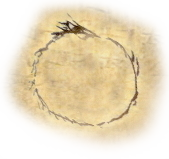Dagger
The Dagger (🗡️) is a small bladed weapon (†) with a handle, wielded in one hand.
Dagger:
🗡️ Stab/Slash:- [dPower] + [(d)Sinew] + 6 [ or d6?] [ + bonuses ]
D.A.G.G.E.R @ 4.1.7.7.5.18 @ 4.1.7.7.5.9 = 42 | 33 | 6
D.A.G.G.E.R = (, )
A dagger deals 6 points of damage upon a successful strike.
A daggers' starting integrity is 12 (4+1+7)
... [blade DA(4+1), handle G(7)]
A masterwork? dagger deals an extra 1 point of damage (ace on 'A') due to it's balanced design and resilient blade edge.
A magic dagger might be difficult to wield unless one's will overcomes it's own, and such a dagger might provide bonuses keyed to it's charm or sinew statistics.
Advanced attack forms (bonuses - TODO):
- D. dextrous attack: +4
- A. strong attack: +1
- G. low or risky attack: +7
- G. tricky attack: +7
- E. smart/cautious attack: +5
- R. wise/intuitive attack: +9
D.G.R = 4.7.9 = 20 [2] | A.E = 1.5 = 6 ( or 10.5 = 15 [6] )
Definition(s):
1. (weaponry) A stabbing weapon, similar to a sword but with a short, double-edged blade.
2. (typography) The text character †; the obelus.
3. (basketball, American football) A point scored near the end of the game (clutch time) to take or increase the scorer's team lead, so that they are likely to win.
Etymology: From Middle English daggere, daggare, dagard, probably adapted from Old French dague (1229), related to Occitan, Italian, Spanish daga, Dutch dagge, German Degen, Middle Low German dagge (“knife's point”), Old Norse daggarðr, Danish daggert, Faroese daggari, Welsh dager, dagr, Breton dac, Albanian thikë (“a knife, dagger”), thek (“to stab, to pierce with a sharp object”).
In English attested from the 1380s. The ultimate origin of the word is unclear. Grimm[1] suspects Celtic origin. Others have suggested derivation from an unattested Vulgar Latin *daca "Dacian [knife]", from the Latin adjective dācus. Chastelain (Dictionaire etymologique, 1750) thought that French dague was a derivation from German dagge, dagen, although not attested until a much later date).
The knightly dagger evolves from the 12th century. Guillaume le Breton (died 1226) uses daca in his Philippide. Other Middle Latin forms include daga, dagga, dagha, dagger, daggerius, daggerium, dagarium, dagarius, diga; the forms with -r- are late 14th century adoptions of the English word). OED points out that there is also an English verb dag (“to stab”) from which this could be a derivation, but the verb is attested only from about 1400.
Relation to Old Armenian դակու (daku, “adze, axe”) has also been suggested[4]. Alternatively, a connection from Proto-Indo-European *dʰāg-u- and cognate with Ancient Greek θήγω (thḗgō, “to sharpen, whet”).
Synonyms:
- (stabbing weapon): dirk, knife
- (text character): obelisk, obelus
- (anything that causes pain like a dagger) barb
Derived spells:
at daggers drawn
bollock dagger
Bridport dagger
bull-dagger
cloak-and-dagger
dagger-axe
dagger board
daggerless
daggerlike
daggerman
dagger moth
dagger of lath
dagger-sharp
daggertooth
double dagger
ear dagger
kidney dagger
look daggers
mutton dagger
parrying dagger
punch dagger
push dagger
Spanish dagger
speak daggers
stab yourself and pass the dagger
stare daggers
Swiss dagger
See also:
